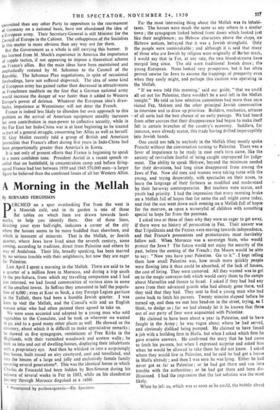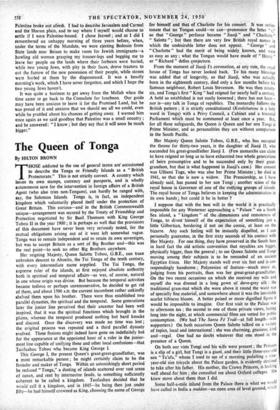A Morning in the Mellah
By BERNARD FERGUSSON pERCHED on a spur overlooking Fez from the west is , a Moorish café, and in its garden is one of those flat tables on which lines are drawn towards land- marks, to help you identify them. One of these lines, directing your eyes half-right, indicates a corner of the city where the houses seems to be more huddled than elsewhere, and which, is innocent of minarets. That is the Mellah, or Jewish quarter, where Jews have lived since the seventh century, some coming, according to tradition, direct from Palestine and others by way of ,Andalusia. Their life, broadly speaking, has been marred by no serious trouble with their neighbours, but now they are eager for Palestine.
Last April I spent a morning in the Mellah. There are said to be a quarter of a million Jews in Morocco, and during a trip south to the pre-Sahara, from which my travelling companion and I had just returned, we had found communities of various sizes in some of the smallest towns. In Seffrou they amounted to half the popula- tion of 6,000; even at Ksar es Souk, a tiny Foreign Legion garrison in the Tafilelt, there had been a humble Jewish quarter. I was keen to visit the Mellah, and the Consul's wife and an English woman artist who had often painted there agreed to take us.
We were soon accosted and adopted by a young man who sold vegetables to the Consulate, and he took us wherever we wanted to go, and to a good many other places as well. He showed us the cemetery, about which it is difficult to make appreciative remarks ; he showed us five synagogues, reminiscent of Free Kirks in the Highlands, with their varnished woodwork and austere walls ; he took us into and out of dwelling-houses, displaying their inhabitants with a proprietary eye. And then he whisked us into a surprisingly fine house, built round an airy courtyard, cool and tessellated, and into the bosom of a large and jolly and exclusively female family covering several generations*. This was the identical house in which Charles de Foucauld had been hidden by Ben-Simoun during his sojourn of several weeks in Fez in 1883, while on his clandestine Journey through Morocco disguised as a rabbi.
. _
*Perpetuated by parthenogenesis.—Eo. Spectator. Far the most interesting thing about the Mellah was its inhabl- tants. The houses were much the same as any others in a similar town ; the synagogues lurked behind front doors which looked just like their neighbours ; no Hebrew characters above the shops, no Hebrew notices, betrayed that it was a Jewish stronghold. Only the people were unmistakable ; and although it is said that many of those who are Jewish by religion were originally of Berber stock, I would say that in Fez, at any rate, the two blood-streams have merged long since. The old wore traditional Jewish dress ; tho young European. None looked very prosperous, but it has often proved unwise for Jews to assume the trappings of prosperity even when they easily might, and perhaps this caution was operating in the Mellah.
"If we were told this morning," said our guide, "that we could all set out for Palestine, there wouldn't be a soul left in the Mellah tonight." He told us how selection committees had more than once visited Fez, Meknes and the other principal Jewish communities to interview and to draw up priorities. Builders, mechanics, artisans of all sorts had the best chance of an early passage. We had heard from other sources that their disappearance had begun to make itself felt in certain branches of the country's economy. Saddlers, for instance, were already scarce, this trade having drifted imperceptibly into Jewish hands.
One could not talk to anybody in the Mellah (they mostly spoke French) without the conversation turning to Palestine. There was a fever of impatience to be ready in case one's turn came, like the anxiety of revivalists fearful of being caught unprepared for judge- ment. The ability to speak Hebrew, beyond the minimum needed for their devotions, had long since disappeared from among the Jews of Fez. Now old men and women were taking turns with the young, and trying desperately, with spectacles on their noses, to learn the language of their forbears as modified and modernised by their far-away contemporaries. But teachers were scarce, and youth had priority. I had the impression that every morning broke on a Mellah full of hopes that for some the call might come today, and that the sun went down each evening on a Mellah full of hop= for the morrow, as upon a nurseryful of children with something special to hope for from the postman.
I asked two or three of them why they were so eager to get away, if there were no history of persecution in Fez. Their answer was that Tripolitania and the Fezzan were moving towards independence, and that France's possessions and protectorates must inevitably follow suit. When Morocco was a sovereign State, who would protect the Jews ? The future would not enjoy the security of the past, before the coming of the French ; the Moors would be able to say : "Now you have your Palestine. Go to it." -I kept telling them how small Palestine was, how much more quickly people were flowing into it than could be absorbed, of the lack of houses, the cost of living. They were unmoved. All they wanted was to get on to the magic conveyor-belt which would carry them to the camps about Marseilles and thence to IsraeL I asked if they had had any news from their advanced guards who had already gone there, and they said that they had. They sent to find a young man who had come back to fetch his parents. Twenty minutes elapsed before he turned up, and then we met him head-on in the street, trying, as, I think., to dodge us ; for we had already let it be known that three out of our party of four were acquainted with Palestine.
He claimed to have been about a year in Palestine, and to have fought in the Army ; he was vague about where he had served, and obviously disliked being pumped. He claimed to have found a job with a building firm in Haifa, but when I asked which firm he gave evasive answers. He confirmed the story, that he had coma to fetch his *parents, but when I expressed surprise and asked him when he would be allowed to take them he did not know. I asked where they would live in Palestine, and he said he had got a house in Haifa already ; and then I was sure he was lying. Either he had never got as far as Palestine ; or he had got there and run into trouble with the authorities ; or he had got there and been dis- illusioned. I had the impression that the last solution was the most likely.
When he left us, which was as soon as he could, the babble about
Palestine broke out afresh. I had to describe Jerusalem and Carmel and the Sharon plain, and to say where I myself would choose to settle if I were Palestine-bound. I chose Jezreel ; and as I did I remembered an unhappy morning of three years before, when, under the terms of the Mandate, we were ejecting Bedouin from State lands near Beisan to make room for Jewish immigrants—a bowling old woman grasping my trouser-legs and begging me to leave her people on the lands where their forbears were buried, while two young Jews, with pity in their faces, drove tractors to cut the furrow of the new possession of their people, while stones were hurled at them by the dispossessed. It was a beastly morning's work, which I have never forgotten. and which I hope the two young Jews haven't.
It was quite a business to get away from the Mellah when the time came to go back to the Consulate for luncheon. Our guide may have been anxious to leave it for the Promised Land, but he was proud of it and anxious that we should see all we could, even while he prattled about his chances of getting away. I warned him once again as we said goodbye that Palestine was a small country ; and he answered: "I know ; but they say that it will soon be much bigger."















































































 Previous page
Previous page